Introduction
Fear of Missing Out (FOMO) is a strong psychological phenomenon that significantly influences decision-making, particularly in the fast-paced world of cryptocurrency investing. When investors witness others making substantial gains, they often feel compelled to invest without thorough research. While FOMO can sometimes lead to high returns, it also carries substantial risks. This article explores FOMO in crypto investing, its potential benefits and risks, and real-world examples to help investors make well-informed decisions.
Understanding FOMO in Crypto Investing

FOMO in crypto refers to the irrational fear of missing a profitable opportunity, leading investors to make impulsive decisions. This emotional reaction is driven by:
- Social media hype from platforms like Twitter, Reddit, TikTok, and Discord.
- Celebrity and influencer endorsements that fuel speculation.
- Sudden price surges creating a sense of urgency.
- Major project launches or partnership announcements triggering exaggerated market reactions.
Example of FOMO in Action
A notable example occurred in 2021 when Dogecoin surged from fractions of a cent to $0.73, fueled by social media hype and Elon Musk’s tweets. Many investors jumped in at peak prices, expecting further growth. However, as the excitement faded, Dogecoin lost a significant portion of its value, resulting in heavy losses for late investors.
Another example is Bitcoin’s historical bull runs. Many retail investors enter the market at all-time highs due to media hype, only to experience price corrections that lead to prolonged periods of losses before recovery.
Potential Benefits of FOMO in Crypto Investing
Although FOMO is often associated with poor investment decisions, it can present opportunities when approached strategically:
1. Early Adoption of High-Growth Projects
- Investors who identify promising trends early can gain significant returns.
- Example: Early Ethereum adopters bought ETH for a few dollars in 2015, and by 2021, it surged past $4,000.
- Recognizing emerging trends like DeFi, NFTs, and Layer 2 scaling solutions has allowed some investors to achieve exponential growth.
2. Increased Market Participation
- FOMO attracts new investors, increasing market liquidity and trading volume.
- The 2021 crypto boom saw millions of new participants enter the space, fueling growth in projects like Solana, Avalanche, and Cardano.
- Higher participation drives innovation, as developers create solutions to meet rising demand.
3. Profitable Momentum Trading Strategies
- Some traders capitalize on FOMO-driven price movements through momentum trading.
- Example: Buying breakouts in strong uptrends can yield quick returns if managed correctly.
- Short-term traders employ scalping strategies to profit from FOMO-induced price surges.
Despite these advantages, the risks of FOMO often outweigh its benefits for inexperienced investors.
Risks of FOMO in Crypto Investing

1. Buying at the Peak
- Many investors enter too late, purchasing assets after significant price increases.
- Sharp price corrections often leave FOMO-driven buyers with losses.
- Example: Shiba Inu (SHIB) saw a meteoric rise in late 2021, but many late investors ended up holding depreciated tokens.
2. Ignoring Fundamental Analysis
- FOMO investors often skip due diligence, leading to poor investment choices.
- Example: The Squid Game Token scam in 2021 promised massive returns but turned out to be a rug pull, leaving investors with worthless assets.
- Many hype-driven projects lack real-world utility, resulting in major losses.
3. Market Manipulation and Volatility
- FOMO-driven investments create extreme volatility, making it easier for whales to manipulate markets.
- Pump-and-dump schemes: Large investors artificially inflate prices, sell at the top, and leave retail investors with losses.
- Meme coins and low-cap assets are especially vulnerable to manipulation.
4. Emotional Stress and Poor Decisions
- Investing based on emotions leads to anxiety, panic selling, and regret.
- Many investors who buy into hype panic-sell when prices dip, realizing unnecessary losses.
- Market crashes can trigger emotional distress and irrational financial decisions.
How to Avoid FOMO in Crypto Investing

1. Do Your Own Research (DYOR)
- Evaluate project fundamentals, including team background, technology, and use case.
- Verify whitepapers, on-chain data, and partnerships before investing.
2. Develop a Clear Investment Strategy
- Set predefined entry and exit points to avoid emotional decision-making.
- Implement stop-loss orders to manage downside risk.
3. Ignore Social Media Hype
- Be skeptical of influencers promoting crypto projects, as many are financially incentivized.
- Avoid making investment choices based solely on trending posts.
4. Diversify Your Portfolio
- Avoid concentrating all investments in one asset.
- Consider allocating funds to established cryptocurrencies like Bitcoin and Ethereum alongside other promising projects.
5. Adopt a Long-Term Perspective
- Crypto markets are cyclical—prices that rise quickly can also fall sharply.
- Focus on quality investments with strong fundamentals rather than short-term speculation.
Conclusion
FOMO is a double-edged sword in crypto investing—it can lead to substantial profits for early adopters but also devastating losses for those who enter too late. Understanding the psychological impact of FOMO, recognizing its risks and rewards, and adopting a disciplined investment approach can help investors navigate the volatile crypto landscape more effectively.
Final Advice
Instead of chasing hype, prioritize projects with strong fundamentals and long-term potential. In crypto investing, patience and strategic decision-making often yield better results than impulsive FOMO-driven trades.
Disclaimer
This article is for informational purposes only and does not constitute financial, investment, or legal advice. Cryptocurrency investments are highly volatile and carry risks. Investors should conduct independent research and consult financial professionals before making any investment decisions.




